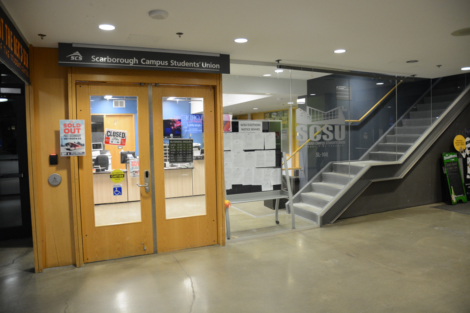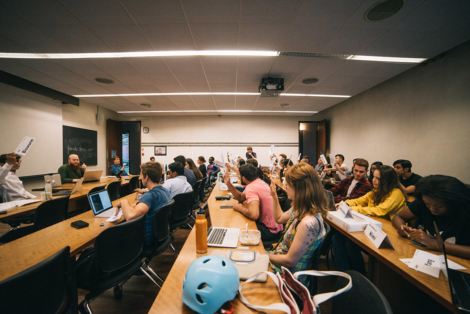What happened at St. Michael’s College is systemic, not isolated
Re: “St. Michael’s College registrarial assistant has history of derogatory posts on social media”
The recent discovery of the derogatory language used by St. Michael’s College (SMC) registrarial assistant Philip Hicks-Malloy’s social media may point to a larger, more systemic issue regarding inclusion at the college. As many will remember, this is not the first time SMC representatives have made insensitive comments with regard to minorities.
Consider the Snapchat videos posted by SMC Student Union executives that included Islamophobic comments back in 2016. Then-SMC president and vice-chancellor David Mulroney responded, “Be sure that your use of social media doesn’t hurt the people that you serve and doesn’t hurt the institution that you serve.” However, it appears that these lessons were not taken to heart by SMC staff.
The fact that these derogatory posts were made on social media belonging to Hicks-Malloy, an individual who has worked at SMC for over 29 years leaves me, yet again, terribly disappointed as an SMC student.
Mulroney’s comment on the Hicks-Malloy case that, “The University of St. Michael’s College deplores any use of language that fails to acknowledge the dignity, respect and worth of every person and that is inconsistent with the values of the University, which are rooted in the Gospel,” appear half-hearted. SMC has been opaque on what measures have been taken to hold Hicks-Malloy accountable for his claims.
His social media is shown to be supporting white nationalist groups and asking his followers to “boycott” brands that offer halal options, which he labels a “symbol of treason.” As a Muslim-identifying woman, these comments, while discomforting, do not surprise me. During my four years at U of T, it appears to me as though SMC has been in one controversy after another, all pointing towards a lack of inclusivity being present at the college.
More work should be done by the college to demonstrate that it is here to represent all of its students. Press statements or apologies are no longer satisfactory in explaining the actions of these individuals who are supposed to represent mine and my fellow students’ interests.
Yasaman Mohaddes is a fourth-year Political Science and Sociology student at St. Michael’s College.
The SCSU needs to do better with food quality
Re: “Scarborough student union apologizes for food quality issue at frosh”

STEVEN LEE/THE VARSITY
The “food quality issue” during the Scarborough Campus Students’ Union’s (SCSU) three-day orientation, in which what appeared to be an insect was found in a first-year student’s meal, yet again raises the question: does the SCSU lack attention when it comes to food?
In this case, the issue was evidently the responsibility of the food vendor’s supplier. Nonetheless, there should be extra scrutiny toward SCSU’s oversight for next year’s orientation week.
Unfortunately, food quality as an issue at UTSC is not a first. There was another case of poor food quality distribution last March, when a UTSC student found an insect in her meal from Asian Gourmet, located in the UTSC Student Centre. The incident at this year’s frosh week will only increase distrust in the SCSU’s food quality maintenance.
Food quality is paramount to students’ health, especially those who pay costly student fees for not only an exceptional education, but also campus services that are supposed to attend to their basic needs. In the defence of the SCSU, food vendors in the UTSC campus that operate in the Student Centre are licensed in separate agreements, in which the SCSU is merely the landlord. However, the SCSU and their Food Partnership Department must act to ensure that food safety does not raise concerns for the university community.
It seems that atonement for the issue has already occurred, with the SCSU saying that administrators will attend Food Handling courses for future events. Let’s hope that this is enough to ensure that history does not repeat itself.
Michael Phoon is a second-year Journalism student at UTSC.
UTSU members should act more responsibly when addressing issues with each other
Re: “Tensions abound at September UTSU board meeting”

ANDY TAKAGI/THE VARSITY
The University of Toronto Students’ Union (UTSU) has — as mentioned on its website — the responsibility for advocacy on behalf of the student voice and service provision, and both of these objectives seem to be missing in its recent discussions.
At the most recent board meeting, there were plenty of accusations that reflected a lack of organization and communication. Board members referring to others as “liars” or indulging in arguments due to a lack of communication is an inappropriate representation of the role of the UTSU, damaging the image of the student union and putting into question the sincerity of executives and directors in their roles as our representatives.
In the future, the board members must remain attentive to the objectives of the student union and their meetings. Executives and directors should work to better communications and clarity within the organization, for students expect their representatives to work in a manner most effective for students at-large. Issues that they may have with one another should be investigated and resolved before being introduced at meetings to avoid confrontations that are unnecessary, such that meetings remain serious with regard to their objectives.
As a representative body of more than 50,000 students, the UTSU must focus on resolving issues of miscommunication and shift their attention back to addressing the needs and concerns of the student body, rather than repeatedly indulging in quarrels.
Abdul Ali is a second-year student studying Political Science and History at St. Michael’s College.
Global action benefits us all
Re: “U of T to open research centre in India as part of School of Cities Alliance”

TROY LAWRENCE/THE VARSITY
It should be anticipated that this research endeavour will come back full circle and help us back here in Canada. Many achievements have come from India, some of which sadly are underappreciated and taken for granted in our everyday lives. Take, for example, the concept of zero and its symbol, or the ingenious decimal positional notation for numbers, otherwise known as the Hindu-Arabic numeral system.
Today, many problems are layered, multi-faceted, and require a multitude of different perspectives in order to confront and solve them. It is reassuring that this research initiative is in the great spirit of multidisciplinary and international collaboration. Together, we can work and help each other and dream of solving the big problems.
I hope that, from the differing scales of problems facing India and Canada, much can be learned, and new knowledge and solutions can be brought back to Canada to help alleviate the problems that Canadian cities face. Toronto faces aging infrastructure, poor urban planning, and criminally long delays in public transportation and the delivery of essential services.
We can both improve and become better together. That is the hope. Someone once told me, in exasperation and frustration with one of the problems here at our university, that in order to solve such a problem, we do not merely need a university; we need a ‘multi-versity.’
In the same spirit, I hope that this initiative is not merely seeking to bring different worlds together, but to unite the one world that we all share and call home.
Oscar Starschild is a Mathematics, Philosophy, and Computer Science student at Woodsworth College.


